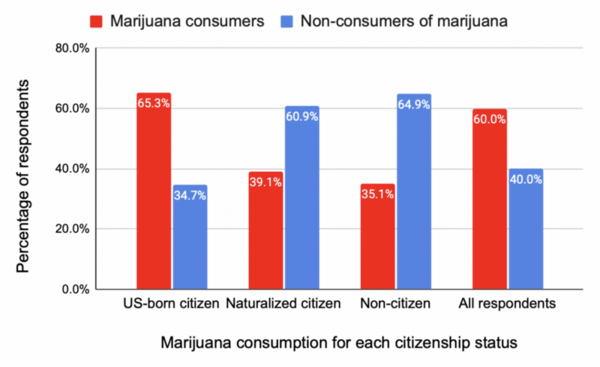Exploring differences in men’s marijuana consumption and cigarette smoking by race and citizenship status
(1) Lynbrook High School, (2) The International School Bangalore, (3) BASIS Independent McLean
https://doi.org/10.59720/23-334
In recent years, the use of marijuana for recreational and medicinal purposes has become increasingly popular and socially accepted in California. In this study, we hypothesized that citizenship status and racial background were associated with marijuana consumption and cigarette smoking. Marijuana users were defined as males who self-report having used marijuana in the past, and smokers were defined as males who reported currently smoking. We used the dataset from 2017–2018 in the California Health Interview Survey (CHIS). Our dataset included 8,587 males from ages 18 to 85 living in metropolitan areas of California. We used a logistic regression model to find correlations between citizenship status and race with marijuana consumption and cigarette smoking. We showed that, relative to US-born citizens, non-citizens and naturalized citizens were less likely to report using marijuana. In addition, we observed that Asian and Latino males were less likely to report consuming marijuana in comparison to White males. American Indians/Alaska Natives, African Americans, Latino, and Other Single/Multiple races were more likely to report smoking cigarettes in comparison to White males. The effect size analysis showed that citizenship status had a medium effect and race had a small effect on marijuana consumption. Both citizenship status and race had a small effect on cigarette smoking. These results suggest that race and citizenship status were correlated with the likelihood of consuming marijuana and smoking cigarettes among adults in California. As marijuana consumption and cigarette smoking are associated with certain health risks, future health improvement efforts could include targeted outreach efforts based on specific citizenship status and race.
This article has been tagged with: